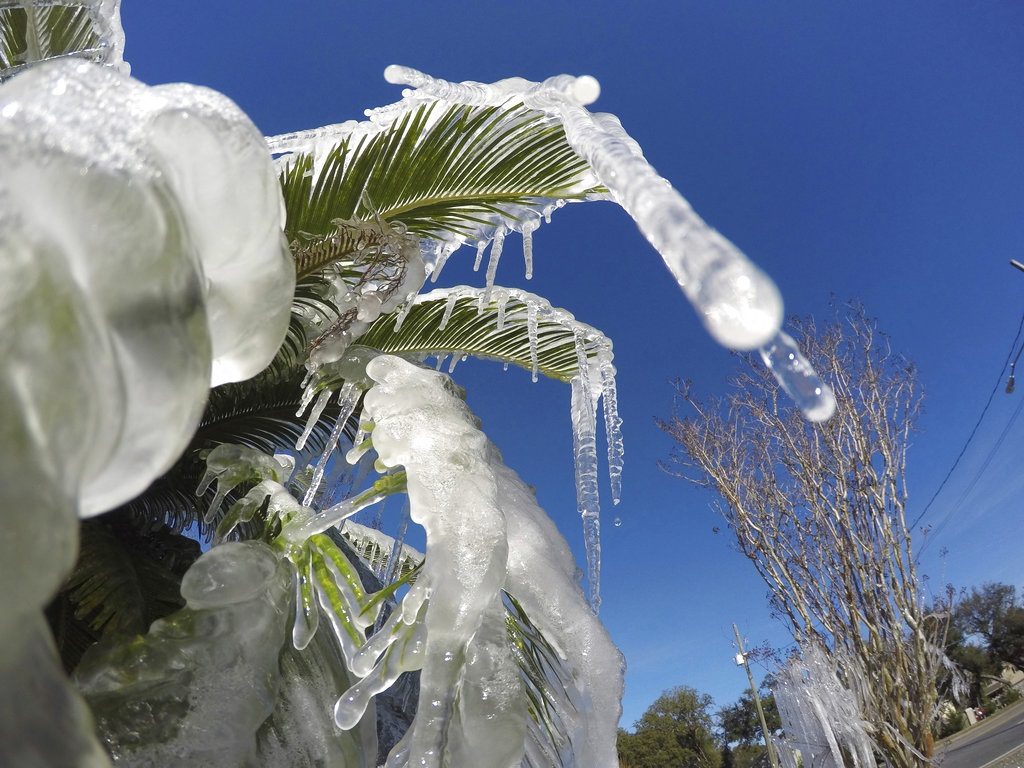Science says: Why there’s a big chill in a warmer world

Water is frozen on a tree in Fort Walton Beach, Fla., on Tuesday, January 2, 2018 after a resident left his sprinklers on. Temperatures are expected to stay below freezing at night for the Panhandle through Thursday morning. (Nick Tomecek/Northwest Florida Daily News via AP)
WASHINGTON — Anchorage, Alaska was warmer Tuesday than Jacksonville, Florida. The weather in the United States is that upside down.
That is because the Arctic’s deeply frigid weather escaped its regular atmospheric jail that traps the worst cold. It then meandered south to the central and eastern US.
And this has been happening more often in recent times, scientists say.
Why is it so cold?
Super cold air is normally locked up in the Arctic in the polar vortex – a gigantic circular weather pattern around the North Pole. A strong polar vortex keeps that cold air hemmed in.
“Then when it weakens, it causes like a dam to burst,” and the cold air heads south, said Judah Cohen, a winter storm expert for Atmospheric Environmental Research, a private firm outside Boston.
“This is not record-breaking for Canada or Alaska or northern Siberia, it’s just misplaced,” said Cohen, who had forecast a colder than normal winter for much of the US.
Is this unusual?
Yes, but more for how long — about 10 days — the cold has lasted, than how cold it has been. On Tuesday, Boston tied its seven-day record for the most consecutive days at or below 20 degrees that was set exactly 100 years ago.
More than 1,600 daily records for cold were tied or broken in the last week of December, according to the National Oceanic and Atmospheric Administration. For Greg Carbin, of the National Weather Service’s Weather Prediction Center, the most meaningful statistics are how last week’s average temperature was the second coldest in more than a century of record-keeping for Minneapolis, Chicago, Detroit, and Kansas City, third coldest in Pittsburgh and fifth coldest in New York City.
Is it just the US?
Pretty much. While the US has been in the deep freeze, the rest of the globe has been toastier than normal. The globe as a whole was 0.9 degrees Fahrenheit (0.5 degrees Celsius) warmer than normal on Tuesday, and the Arctic was more than 6 degrees Fahrenheit (3.4 degrees Celsius) warmer than normal, according to the analysis of the University of Maine Climate Change Institute.
What’s next?
The cold will continue and could actually worsen for much of the East Coast this weekend because of a monster storm that is brewing in the Atlantic and Caribbean, what meteorologists are calling a “snow hurricane” or “bomb cyclone.”
But forecasters do not think the storm will hit the East Coast, keeping most of the snow and worst winds over the open ocean, although parts of the Northeast are still likely to get high winds, waves, and some snow.
“For the Northeast, this weekend might be the coldest of the coldest with the storm,” said Jason Furtado, a University of Oklahoma meteorology professor. “We could be ending (the cold snap) with a big hurrah.”
What makes the polar vortex move?
This is an area of hot debate and research among scientists and probably is a mix of human-caused climate change and natural variability, said Furtado.
Climate change has not made the polar vortex more extreme, but it probably is making it move more, which makes the weather seem more extreme, he also said.
A recent study by Potsdam Institute climate scientist Marlene Kretschmer found the polar vortex has weakened and meandered more often since 1990, but that study focused more on Europe. Ongoing research shows that there seems to be a similar connection for more frequent Arctic cold snaps like what the US is now experiencing, Kretschmer said.
How can it be so cold with global warming?
Do not confuse weather — which is a few days or weeks in one region — with climate, which is over years and decades and global.
Weather is like a person’s mood, which changes frequently, while climate is like someone’s personality, which is more long-term, Furtado said.
“A few cold days doesn’t disprove climate change,” Furtado said. “That’s just silly. Just like a couple down days on the stock market doesn’t mean the economy is going into the trash.” /kga














